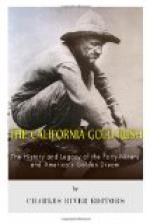King was a man of keen mind and dauntless courage, who had tried his luck briefly at the mines, realized that the physical work was too much for him, and had therefore returned to mercantile and banking pursuits in San Francisco. His peculiar name was said to be due to the fact that at the age of sixteen, finding another James King in his immediate circle, he had added his father’s name as a distinguishing mark. He was rarely mentioned except with the full designation—James King of William. On his return he opened a private banking-house, brought out his family, and entered the life of the town. For a time his banking career prospered and he acquired a moderate fortune, but in 1854 unwise investments forced him to close his office. In a high-minded fashion, very unusual in those times and even now somewhat rare, he surrendered to his creditors everything on earth he possessed. He then accepted a salaried position with Adams and Company, which he held until that house also failed. Since to the outside world his connection with the firm looked dubious, he exonerated himself through a series of pamphlets and short newspaper articles. The vigor and force of their style arrested attention, so that when his dauntless crusading spirit, revolting against the carnival of crime both subtle and obvious, desired to edit a newspaper, he had no difficulty in raising the small sum of money necessary. He had always expressed his opinions clearly and fearlessly, and the public watched with the greatest interest the appearance of the new sheet.
The first number of the Daily Evening Bulletin appeared on October 8, 1855. Like all papers of that day and like many of the English papers now, its first page was completely covered with small advertisements. A thin driblet of local items occupied a column on the third and fourth pages, and a single column of editorials ran down the second. As a newspaper it seemed beneath contempt, but the editorials made men sit up and take notice. King started with an attack on Palmer, Cook, and Company’s methods. He said nothing whatever about the robberies. He dealt exclusively with the excessive rentals for postal boxes charged the public by Palmer, Cook, and Company. That seemed a comparatively small and harmless matter, but King made it interesting by mentioning exact names, recording specific instances, avoiding any generalities, and stating plainly that this was merely a beginning in the exposure of methods. Jones of Palmer, Cook, and Company—that same Jones who had been arrested with Cohen—immediately visited King in his office with the object of either intimidating or bribing him as the circumstances seemed to advise. He bragged of horsewhips and duels, but returned rather noncommittal. The next evening the Bulletin reported Jones’s visit simply as an item of news, faithfully, sarcastically, and in a pompous vein. There followed no comment whatever. The next number, now eagerly purchased




